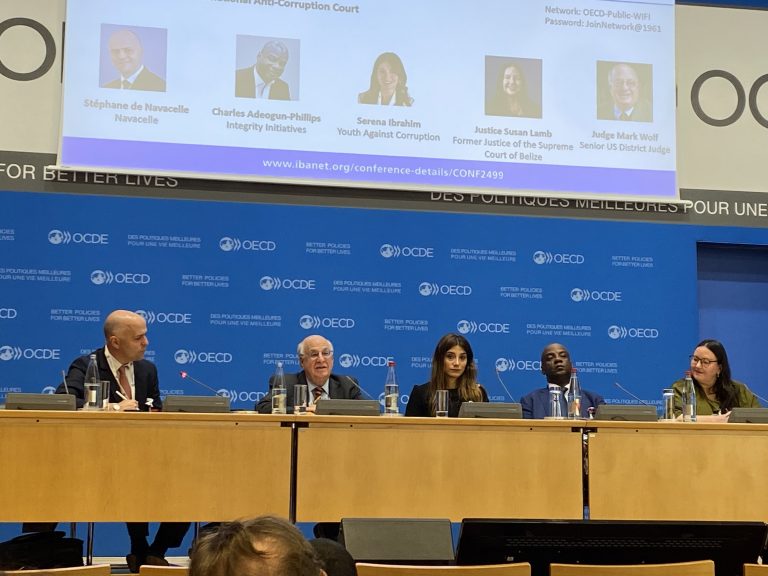Arbitration, which is defined as a private and binding form of dispute resolution forum, in which parties agree to have their dispute settled by independent, non-governmental decision-makers (hereinafter ‘arbitrators’), selected by or for the parties, applying neutral adjudicative procedures,[1] has become the preferred method of resolving cross-border disputes.[2]
Across the world, companies are required to set up internal compliance programs to guarantee, amongst other things, the fight against corruption, the observance of international sanctions, the respect of human rights and the protection of the environment and personal data.
Compliance, whose scope of application is constantly expanding, has become a strategic tool for companies to prevent the realization of a risk regardless of their field of activity. Compliance rules are often burdensome, sometimes straying from legal notions and often including severe enforcement actions and penalties. This is particularly true with respect to international trade, when companies having to comply with external mandatory rules and regulations to maintain contractual relationships, protect their data, and prevent financial crimes.
As a result, questions have more than ever arisen as to the impact of growing compliance requirements on the practice of arbitration, allowing compliance to find its place in the field of arbitration. This growing importance first raises the question of the arbitrability of compliance law, then of the impact of compliance on the arbitration activity itself, and finally demonstrates that arbitrators have become actors in implementing and respecting compliance requirements. It is these different interplays that are worth examining in greater detail.
The increasing arbitrability of compliance matters
Arbitrability is a condition for the lawfulness of the arbitration agreement which refers to the type of dispute that can or cannot be settled by arbitration. It answers the question of whether national laws or judicial authorities have barred certain disputes from being arbitrated and reserved these matters to national courts.[3]
Under French law, the criterions to determine arbitrability are set out in Articles 2059 and 2060 of the French Civil code. Article 2059 of the French Civil code states positively that: “All persons may make arbitration agreements relating to rights of which they have the free disposal”.[4] Article 2060 then defines arbitrability negatively by providing that: “One may not enter into arbitration agreements in matters of status and capacity of persons, in those relating to divorce or to judicial separation or disputes relating to public bodies and institutions, and, more generally, in all matters in which public policy is concerned. However, categories of public institutions of an industrial or commercial character may be authorized by decree to enter into arbitration agreements”.[5]
According to Article 2060 of the French Civil code, arbitration is prohibited in all matters in which public policy is concerned. In theory, this provision gave the French legislator the power to limit the matters which may be arbitrated by enacting public policy laws. The objective was to protect certain areas of law deemed fundamental where arbitral jurisdiction should be excluded. Today, however, Article 2060 of the French Civil code has been somewhat cleared of its substance by specific legislative provisions and French case law[6] which progressively allowed arbitrators to apply principles of public policy to the merits of the dispute,[7] and even to sanction a party for violating a rule of public policy.[8]
Although arbitration fits into the “world of contracts”, a world where the consent of parties is paramount, compliance is rather an obligation imposed on the parties.[9] It was therefore not obvious that these two fields would meet. However, the question of the arbitrability of compliance is one of the issues which arose.[10]
This question must nevertheless be understood broadly as there is no general law on compliance but rather compliance is present in a vast category of fields.
The fight against corruption is a clear example of an initially rejected[11] but now widely accepted[12] issue in arbitration, materialized by an international consensus.[13] Such matter is the prime example in which arbitration must consider compliance. In addition, in other regulated matters such as the financial and banking sector,[14] or in antitrust law,[15] the arbitrability of these disputes is also now widely accepted.
Most probably in the future, disputes arising from the application of different compliance programs may be referred to an arbitration tribunal.
Adjustment of arbitration to the burden of compliance
Arbitration has been also strongly influenced by the trend towards compliance and has had to adapt thus affecting different key arbitration principles.
This is notably the case of the confidentiality principle,[16] considered as one of most important characteristics of arbitration.[17] This principle allows both the protection of business interest (e.g., protection of one’s reputation, protection of trade secrets etc.) and the efficiency of the arbitral process.[18] Yet, there has been calls for transparency in international commercial arbitration as it has been argued that increased transparency is necessary to assure that arbitration continues to succeed as an efficient and reliable method of dispute resolution. This need for transparency can be demonstrated by the growth of certain disclosure obligations. As an example, publicly listed companies have seen the advantage of confidentiality diminished by laws and regulations requiring disclosure of financial and extra-financial information directed at the market.[19] Compliance with such requirements is necessary to avoid any financial sanctions imposed by national rules and regulation. Greater transparency is likely to apply to the world of arbitration, as it applies to the world of compliance, but these notions are not necessarily adverse. A right balance between the interests of parties seeking confidentiality in arbitration and the need for greater transparency needs to be found.[20]
In addition, arbitral institutions themselves have had to adapt to different compliance requirements imposed on them by relevant regulatory authorities. For example, data protection and cybersecurity concerns during the arbitration proceeding are new arbitration hazards that arbitral institutions will have to deal with in the future. More specifically, the ICC, one of the biggest arbitral institutions worldwide, has published a Note to Parties and arbitral tribunals[21] to provide them with all the relevant information regarding compliance obligations imposed by some regulatory authorities during arbitral proceedings (e.g., sanction regulations[22] ). In this note, it is provided that the ICC itself may be required to comply with obligations imposed by French and US authorities, should they request information.[23] It also has had to adapt to certain compliance requirements, notably in terms of payments.[24]
All actors of the arbitral world have been adapting to give some space to compliance requirements and thus avoid any sanctions.
The role of arbitrators in dealing with compliance matters
As arbitrators have become the common “judges” of international trade and commerce, it is not surprising that they come across compliance issues and requirements when handling arbitral cases.
In recent years, arbitration has seen an increasing number of corruption allegations. It consequently raised different questions such as the impact of compliance on the arbitrator’s treatment of corruption or even the importance of the arbitrator’s knowledge of the many technical issues related to compliance law. Arbitrators have thus taken a major role in taking into consideration compliance regulations with respect to corruption.
Traditionally, arbitrators refused jurisdiction over disputes involving corruption issues. The ICC Case No. 1110 is a brazen example in which the sole arbitrator declined jurisdiction when a contract had been obtained through corruption.[25] This however seems to be a challenge of the past, as there is a consensus that arbitral tribunals must no longer decline jurisdiction over corruption issues.[26]
To do so, arbitrators have had to comply with the internal and international rules and recommendations on the subject. For instance, arbitrators are now using the “red flag” methodology, inspired by the OECD Convention and the American Foreign Corrupt Practice Act (FCPA) of 1977 which allows arbitrators to determine the existence of a corrupt situation[27] relying on different indicators, circumstantial evidence or “red flags” that could indicate the existence of a corrupt situation. Such indicators do not form an exhaustive and limited list but include : the fact that a contract was awarded without a call for tender even though it is required by the country’s regulations, the payment of intermediaries on a commission basis, the high amount of commissions, or the circumstances surrounding their payment, the intermediary’s lack of experience or qualification, the refusal to provide some documents (e.g., bank statements) etc.[28] Yet, if such elements are with no doubt useful elements to assess the existence of illicit activities (such as corruption, money laundering etc.), arbitrators need to keep in mind that the existence of such elements should not become an irrefutable presumption of corruption.
In addition, arbitrators who initially lacked investigative powers are now actively taking a part in the fight against corruption by making document requests to obtain specific information.[29] Arbitrators also increasingly tend to ask questions directly to the parties to clarify their doubts.
In practice, arbitrators were at first very timid regarding the annulment of contracts tainted by corruption. The first case known in arbitration in which a contract tainted by corruption was set aside by an arbitral tribunal was the ICC Case No. 12990 dated December 2005.[30]
Yet, arbitrators will now become more and more active in the fight against corruption. Therefore, when asked either to enforce an arbitral award or to set it aside, national courts are also playing a crucial role to avoid endorsing corruption practices.[31] The control exercised by the national judges will push the arbitrators to be careful to render enforceable awards that do not endorse an illegal enterprise and become a real actor in the fight against corruption. With regards to the control operated by French on the violation of international public policy – the Belokon,[32] the Alstom[33] and the Sorelec[34] cases are good illustrations of the red flags techniques used by French judges to identify “serious, precise and concordant indications” of corruption and to prevent the enforcement in France of an award rendered abroad but judged to be in “manifest, effective and concrete” violation of the French conception of international public policy.
Besides the corruption example, it is likely that arbitrators will have to deal with an increasing number of matters dealing with compliance and verify the correct application of laws and regulation. Thus, we are still at the beginning of the interactions between arbitration and compliance. Only time will allow us to assess the real role of the different arbitral actors, and most precisely of arbitrators, in implementing and respecting compliance requirements.











